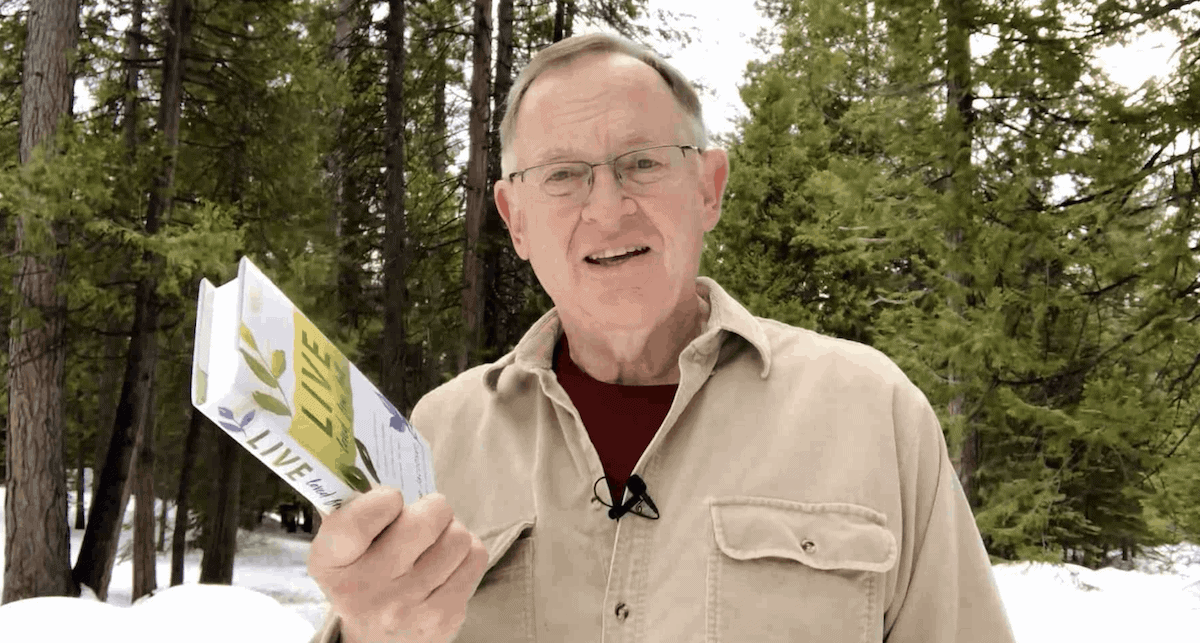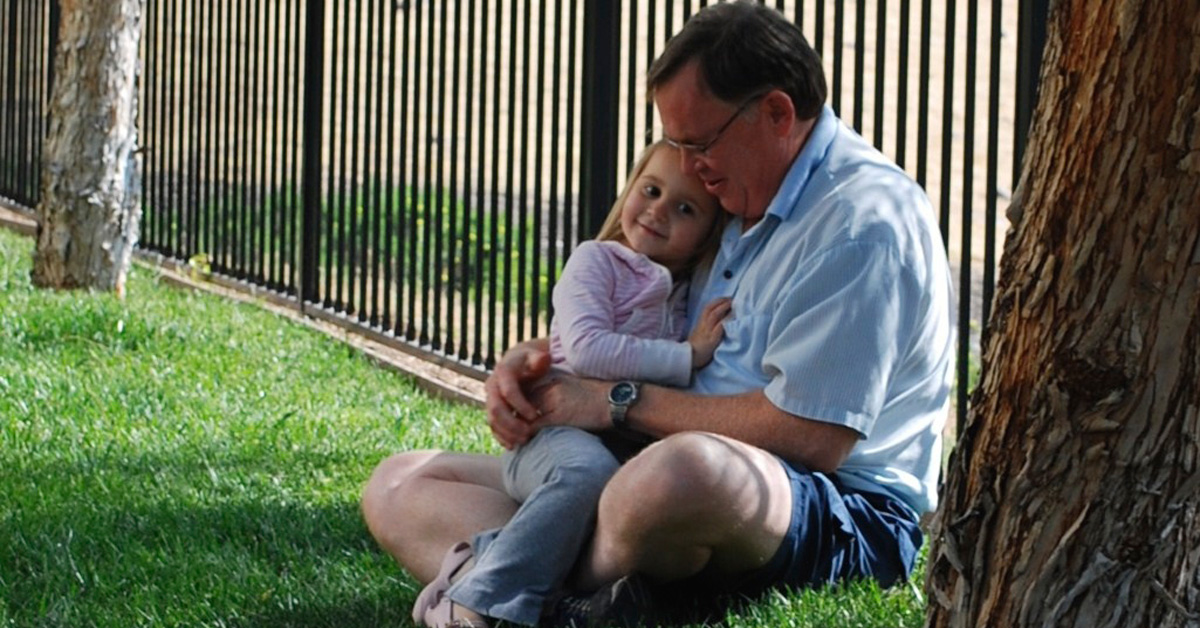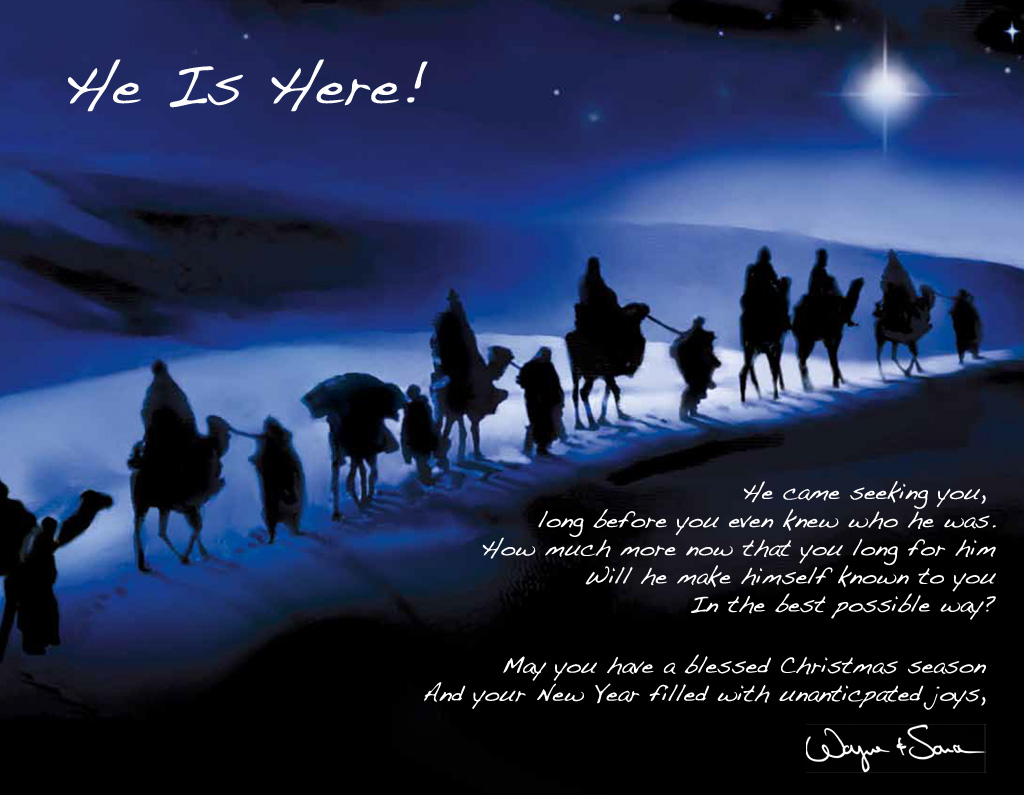Living Loved • Winter 2013 Current Issue
I had just spent the weekend in a country home talking with a group of people about living in the Father’s love. Afterwards two of them drove me to the airport nearly two hours away. The questions continued until we were close to the airport. Finally, a twenty-one year-old medical student in the back seat made one of the most insightful observations I’ve ever heard, “You know what I’m beginning to think, Wayne? Maybe the reason this journey seems so difficult is because it is far easier than we dare to believe!”
Read it again. Having written about finding a real relationship with God for 25 years, I get lots of email from frustrated people. Though they’ve read my books and listened to most of my audio they still feel as if they have little or no connection with God. Many feel forsaken, others wonder if he even exists.
The reason this journey seems so difficult is because it is far easier than we dare to believe!
I know it isn’t easy for people to find their way into a loving relationship with the Father. Everything we’ve learned and believed before runs counter to the dynamics of recognizing and resting in his love. However, it isn’t difficult because God makes it complicated, or because it takes a certain skill set or sensitivity, but because we look in the wrong places for how his life takes root in us.
But Jesus knows that too, and is still up to the challenge of engaging us in a fruitful relationship with his Father.
Uncomfortable Scriptures
In this article I want to look at several Scriptures that make some people nervous, because they seem judgmental and threatening. Most have only heard them in the context of religious performance and thus dismiss them as inconsistent with his love, but in doing so they toss aside some of the most helpful insight Jesus gave people to embrace this journey.
For instance, Jesus warned us that the road into his life is a narrow road. Enter through the narrow gate. For wide is the gate and broad is the road that leads to destruction, and many enter through it. But small is the gate and narrow the road that leads to life, and only a few find it (Matt. 7:13-14).
I know this has been preached to fill people with fear, but what if Jesus didn’t say this to push people harder on the religious treadmill? In fact, I don’t think his words are about eternal destiny at all, but rather an encouragement to a different way of living in this age. Salvation for Jesus was not giving out a get-out-of-hell-free card, but opening a door for us into a relationship with his Father.
Only the religious would twist them either to take pride in thinking they practice the right doctrine or ritual, and delight in the fact that those who don’t will get what they deserve. Jesus didn’t want to provoke exclusivity or fear with his words, but rather to equip hungry hearts to know how to know him. Following the broad way of self-interest will devour us, but there is a narrower path that will lead us to life.
I used to think that people were transformed by hearing the truth of Scripture and then applying those principles to life. Except that it never worked. People can listen to thousands of sermons and read hundreds of books and still feel like they don’t get it. No wonder Jesus didn’t preach sermons with application points at the end, but walked with people, answering their questions and stimulating their better hopes. In the face of those realities, he pointed down the road his Father would have them go, where they could know him and live freely in his life.
God writes his will in our hearts and minds, not in sermons and books. Until we learn to follow him in the simplest choices of daily life we’ll continue to miss out. I’ve had many people tell me, I’ve been pursuing God for years, and I am no closer to him now than when I started. My heart breaks for them. I’m sure they are genuine, but I also know they are missing him somehow. It could be that they keep following a broad way and miss his invitations to a narrower road.
That’s why Jesus contrasted the broad road with the narrow one. His way is not obvious to our natural inclinations. It may not look as satisfying at the outset, but that’s because true joy and freedom don’t lie in the things we think we want, or what the crowd tells us we want, but by embracing what God knows is best for us. That’s why he also warned us, Whoever wants to save his life will lose it, but whoever loses his life for me will find it (Matt. 16:25). He knew the way of destruction puts up an attractive facade that appeals to our selfish desires and the illusion of an easier way.
Every day we make dozens of choices about how we live our lives and how we treat people around us. In these moments we’ll be confronted with a number of options. Many will be obvious and fit into our self-satisfying cultural and religious norms. But those roads won’t lead us to life in him.
The doorway to his life runs through narrow doorways, not grand ones. In our daily choices we have the opportunity to merge off of the broader way and find a more gracious home on a narrower path. I know that isn’t glamorous, and some would prefer a spectacular revival service or rigorous discipleship school. But the life of Jesus is about learning to listen to his impulses in the next choice before you.
The Broader Roads
So at moments of choice, what determines the path you take?
Sometimes it’s as simple as following the flesh’s desire, either to maximize our happiness, or to minimize our pain in whatever circumstance we are in. Simply doing what’s easiest, what makes us feel good, what soothes our ego, or what is in our financial or personal self-interest, will work to our destruction. We can easily lose ourselves just going along with the distractions of this age, be they too much entertainment, political arguments, or the mundane chores of life.
At other times it can be far subtler, the still lingering coping mechanism that helped us survive childhood trauma, but now leads us to harmful routes. Religious obligation provides a compelling voice in most situations, especially since we’re doing what we have to do, not what we want to do. But it is all the more dangerous because it appears to be righteous even as it draws us into the appearance of self-denial. Even trying to build a ministry or an income stream from it, instead of simply making God’s gifts available will drive us to choices that will prove more hurtful than helpful.
Almost all of these pathways were sculpted in our youth or in our religious training and they come so automatically to us, we may not even be conscious how much they shape us. But, when God begins to invite us into his life, he does so in the simplest places. It often has far more to do with how we treat the next person before us with love and forgiveness, or doing something he’s given us to do.
Making space for him and his thoughts and following them is the only way off the broader road. We find the narrow road when we find rest in his love for us and then recognize his leading as he offers us a different way to see what’s going on around us. We often don’t even see a new trailhead until he nudges us towards it.
At first, everything in us wants to resist his nudge. No, it can’t be that way. I could get hurt. I could make a mistake. What if it goes wrong? But if he’s the one inviting us, we are safer doing what he asks than anything we do to save ourselves. We are not asked to indulge our preferences or live in resistance to them. We are simply called to follow him, in the simplest of choices as best we recognize his invitations. As we do, his life will unfold in us with ever-increasing reality.
How Do You Know?
God speaks to all of us. You don’t have to be a spiritual giant or a gifted seer. You only have to have a heart that wants to follow him and he will teach you how he speaks to you and invites you into life.
Many think they’ve never heard him, but that may only be because they have not yet learned to recognize how he speaks to them. I’ve no doubt he’s speaking, but they may be looking for a voice instead of a nudge or wanting him to say something different than what he is saying. Listening to him is not living by feelings, but by recognizing those impulses he brings to your mind and following them. Initially they will encourage you to rest in his love and to be more gracious to people near you. In time, he will show you more of his wisdom to guide your life.
You will only learn by practice. Yes, you will do some things you thought God was leading you to do, only to find out by the fruit of it that it was more your thought than his. That’s part of the process. How else will you learn? But you’ll also get some things right and the joy of that will help tune our heart to his. In the process, you’ll be drawn closer to him and come to recognize your more selfish aspirations, and the misplaced trust you have in your own wisdom or abilities.
I know there are many examples of those who claim God told them to do the most bizarre things that are hurtful and destructive to themselves and others. You can usually tell if someone’s listening to Jesus by how open and relaxed they are. If they are closed and defensive when someone questions them, be careful. I walked away from an encounter recently with one such person and commented to a friend, “That’s the kind of person that gives listening to God a bad name.”
One thing I know about people who listen to God, they don’t act destructively and they aren’t arrogant about what they think they hear. Learning to listen to God is a humbling process. You’re never one hundred percent sure of what he’s asking. You just have an impulse in your heart you can’t explain. It grows over time, but he is never forceful or manipulative, and that is also true of people learning to listen to him. They can be firm, but not defensive and are always willing to sacrifice for others, instead of asking others to sacrifice for them.
Choices Matter
God does love you, but that love only transforms you to the degree that you can trust his love enough to follow him on to the narrow road. His love doesn’t mean that everything will work out the way we want, nor that we won’t be the victims of other people’s hurtful and destructive choices.
But he wants to be with us in those moments to help us navigate our experience in a broken world and be transformed through it. He invites us to participate with him, which is why love and obedience go hand in hand in the Scriptures. As you grow to trust his love you will want to obey him, and it’s in following him that you get to live in the fruit of his love.
Jesus repeatedly made clear that our actions matter. Scripture often invokes the reality of sowing and reaping to express this truth. How we live either leads us more into his life, or draws us away from it, whether we’ll contribute to his redemption in the world, or be part of its destruction. That’s what Jesus meant when he affirmed those who followed, Well done! You have been faithful with a few things; I will put you in charge of many things. Come and share your master’s happiness! (Matt. 25: 21)
Many find verses like this disconcerting, especially when Jesus warns the faithless that even what they have would be taken away. It sounds like those who have, get more and those that don’t have, are left out. But Jesus was not talking the language of reward and retribution here; he was talking about the unseen consequences of our choices. If we follow a bit, the road will get clearer. If we follow our own way instead, we’ll lose sight of him.
That doesn’t mean you have to be perfect for God to work in you, or that you can’t reverse the trend any day you want to. He is always ready to lead you one simple step at a time and never asks for what you cannot give. Following in small things today will open more doors tomorrow. If we’re indulgent and dishonest in little things, we will be indulgent and dishonest in larger things. If we can learn to follow him in simple ways of loving others and being true to our word even when it hurts, his work in us will grow in ways we’d never conceive.
This is not about earning his life by our obedience, but participating with him as he transforms us. Everything I get to experience of God today began with simple choices years ago. They set off a chain of unforeseen consequences that opened doors to where I live now. The simple nudge to go to public schools with our children and volunteer to help began a series of opportunities that eventually led to twenty years of consulting public schools on religious liberty conflicts. Listening to Jesus say, “I have more to teach you if you walk away,” when my former co-pastor wanted to force me out of the fellowship we helped build together, opened a trailhead into personal transformation I adore and opportunities for growing and sharing I would not have found without him.
At the outset, all these choices looked more difficult than other options I had in mind. I’m glad he won me into following him and the choice to do so now is far easier. I don’t even trust my own desires anymore because following him, even though painful at times, has always yielded better fruit.
It’s A Process
If you view the life of Jesus as a performance treadmill, what I’m writing will only create anxiety and pressure for you to work harder. That will lead you to despair and hopelessness, which is the opposite of what Jesus intended. Learning to merge off of the broad way and onto the narrow road is a process that he wants to work in you, not a requirement he’s made for you. It’s simply a matter of learning to lean into him a bit more each day and leaning away from what draws you down the broader road. You can’t do this alone.
And this does not mean you have to carefully listen to Jesus at every moment and try to figure out what he wants so you won’t miss out. Doing that will leave you frustrated and exhausted. We find his way much more simply than that. In fact, the anxiety of having to hear him will make it more difficult to do so. Instead go through your day with a growing awareness that he is with you. Whenever you have it, follow that inner sense that seems to encourage you one direction or checks you from going another. When you come up against choices of significance, ask him what he has in mind. Let him show you in his time. You don’t have to hear something every day or in every circumstance. Relax in him as he connects your heart with his.
Learning to live out of your spirit, rather than your intellect or emotions alone, will take some time. Ask him to show you the next step ahead and relax in a growing trust that he will. The Spirit makes his direction clear in a variety of ways–it might be that stray thought in your mind, affirmed by something that you read or hear, perhaps even a lyric of a song in the background that resonates with your heart. Don’t look for a “voice” per se, but a growing awareness of his thoughts in your mind. Of course, familiarity with his words in Scripture and conversations with others on a similar journey will also bring clarity to what he’s showing you.
As I go about my life, I become aware of options that are better than my own, especially in helping someone near me, or drawing me into a quieter space with him. At first, I don’t always like where these nudges would lead me, which is why Jesus saw this journey as a narrower road and why most people miss it. Our flesh so easily dismisses what it doesn’t want to consider. And, no, you don’t have to always get it right. No one does.
As you make a few choices down the narrow road, you will find yourself becoming more relaxed and able to live in the moment instead of trying to manipulate your circumstances. The questions you’ll find yourself asking might be these: What does he want to show me about himself today? What might love lead me to do in this situation? How does loving others, even at the expense of my self-interest perpetuate the kingdom? How does my forgiveness or service to someone else today, make the world a better place?
But even when you miss him and find yourself on a path of your own making, he is there, too, still nudging you toward a better road. Don’t be hard on yourself, just keep coming back to him over and over. You are loved, even in your brokenness. Today is the day God cares about. As they say, the best time to plant an oak tree was twenty years ago, but the second best time to plant it is today.
As you learn to live more on the narrow road, you’ll have a better idea just how destructive the broad way was, to yourself and others. Rather than be embarrassed by it, embrace that new reality. One of the most redemptive things we do on the narrow road is to go back to people we’ve wronged, seek their forgiveness and offer restitution where we can. Such moments bring great healing and clarity to all involved. Yes, it may not be easy, but that’s exactly the point of the narrow road–most fruitful things aren’t fun at the outset, but yield great joy later on.
Learning to follow him in the reality of daily life will have far-reaching consequences that will open up possibilities you would never see coming. That’s why Jesus warned Nicodemus that if he couldn’t believe him about earthly things, he’d never grasp what Jesus wanted to show him about heavenly things.
True Discipleship
The room was filled with a church planting team that gathered weekly in a coffee shop. But every year they don’t meet during the last month of summer to give everyone a break. They had just completed that month and told me that it is always their best month of community and growth. More fellowship, outreach, and interaction took place in that one month than the other eleven. They wanted to know how they could capture the spirit of that month in their meetings.
“Why try?” I asked. “If that’s your best month, maybe what you’re looking for is down that road?” I could tell the thought had never crossed their minds. They were having trouble grasping it now. How could they be “a church” without their meeting?
But the choice was so clearly before them and what they’d learn down that road would transform them in ways the status quo never would. That’s why Jesus encouraged us to look past how everyone else is doing things, and find out what he is asking of us.
Perhaps the most effective form of discipleship is not teaching a curriculum, but simply being alongside others when they are at a fork in the road and being a cheerleader for the road less traveled. We don’t have to manipulate or pressure them, but simply through a question or observation give them an opportunity to make a choice that matters. And if they make it, lend them our support and encouragement. That’s how people find their way onto a journey that will be full of his life.
The only reason why his way may seem difficult is because we’re so busy following the crowd that we miss his invitation to a narrower road. But once we learn to believe him, it becomes far easier than most think possible.
And though you’ll find yourself on a road most others can’t understand, it will change the way you think, live, and how you treat others. You’ll find yourself on a transformative journey that you will never regret.
Go to Quotes and Humor
Download Article:
OTHER TRANSLATIONS
Living Loved is published periodically by Lifestream Ministries and is sent free of charge to anyone who requests it. For those with email we recommend our web-based version so that we can hold down costs and get it to you much more quickly. This is especially important for international subscribers.
© Copyright 2013 Lifestream Ministries
Permission is hereby granted to anyone wishing to make copies for free distribution.
<< Previous Issue of Living Loved
Articles in Chronological Order | Articles by Content















 After telling me he no longer loves me, my husband left me in September of last year, and we are still separated. The last several months (8 months since he told me he no longer believes in God, 5 months since he left me) have been the most excruciatingly painful, yet spectacularly amazing, months I ever could have imagined. The freedom you talk and write about…it’s real.
After telling me he no longer loves me, my husband left me in September of last year, and we are still separated. The last several months (8 months since he told me he no longer believes in God, 5 months since he left me) have been the most excruciatingly painful, yet spectacularly amazing, months I ever could have imagined. The freedom you talk and write about…it’s real.



